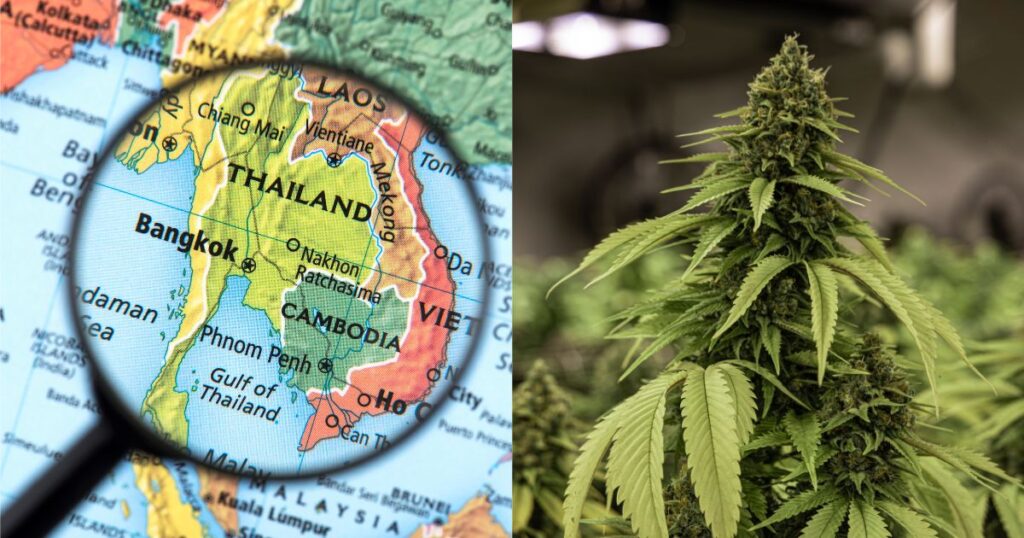Thailand, once the forefront leader in Asia for cannabis decriminalization, has now officially taken a sharp turn away from recreational cannabis use. With declared intentions to once again categorize cannabis as a narcotic, the Thai government has positioned medical use as the sole legal purpose for the plant. This policy shift has severe implications throughout Thailand’s cannabis industry, which could affect businesses, farmers, and consumers alike.
Thailand’s Decriminalization Experiment
Back in 2022, Thailand achieved recognition as the first country in Asia to decriminalize cannabis. This step was initiated by the Bhumjaithai Party, a coalition member of the governing body at the time, under the leadership of then-Health Minister Anutin Charnvirakul.
The premise of the policy centered largely on medical cannabis, offering patients an alternative treatment option and encouraging economic growth through tourism and agriculture.
Without comprehensive regulations to govern recreational use, however, Thailand swiftly became a hotspot for cannabis enthusiasts and businesses alike. By 2025, over 10,000 dispensaries and cannabis-related shops dotted the nation, transforming it into a multi-billion-dollar industry.
The early projections estimated the cannabis market could grow to $1.2 billion by 2025, boosted further by cannabis tourism.
But this surge came with criticism. Unregulated access to cannabis raised concerns, especially regarding youth misuse and illegal smuggling. Some government officials, including those in the current Pheu Thai Party administration, cited public health implications as justification for stricter regulatory measures and roll back to strictly medical marijuana.
The New Rules for Cannabis in Thailand
On June 26, 2025, Thailand reclassified cannabis buds as a “controlled herb” and officially banned sales for recreational use. Health Minister Somsak Thepsutin introduced stringent measures to bring cannabis back under tighter control, framing the changes as necessary safeguards for public health and safety.
Key elements of the new regulations reported by TIME include:
- Prescription Requirement: Cannabis can now only be sold to individuals with a prescription from a licensed medical practitioner. The prescription must specify the amount of cannabis required, capped at a 30-day dosage.
- Licensed Suppliers Only: Dispensaries must source products exclusively from state certified, pharmaceutical-grade farms.
- Sales Limitations: Cannabis sales are prohibited in religious sites, public parks, dormitories, amusement parks, zoos, and through vending machines or online platforms.
- Enhanced Oversight: Dispensaries are required to declare monthly reports on cannabis use, sales, and sourcing. Violators face fines of up to 20,000 Baht ($614) and up to one year in prison.
While the process to fully reclassify cannabis as a narcotic is still progressing, it is clear the government’s focus is on returning cannabis usage to its initial medical-only framework.
Politics and the Shift in Policy
The rapid rise and sudden restriction of cannabis in Thailand reveal deeper political undertones. Bhumjaithai Party’s push for decriminalization in 2022 earned cannabis advocates’ praise, but it also came with political trade-offs. The party had a vested interest in maintaining a loosely regulated cannabis industry.
When Bhumjaithai withdrew from the Pheu Thai-led coalition in 2025, citing unresolved political tensions, it paved the way for a policy overhaul. Prime Minister Paetongtarn Shinawatra’s administration took the departure as an opening to implement stricter regulations on cannabis, aligning with its campaign promises.
Public opinion has also played a role, with polls showing growing preference among Thais to reimpose stricter controls over cannabis. Political leaders have heavily leaned on these sentiments to justify their regulation-focused narratives. Still, accusations of political opportunism and fragmented policymaking continue to cloud the picture.
Could Regulation Early On Have Created a Better Cannabis Industry in Thailand?
One consistent criticism of Thailand’s initial decriminalization efforts was the absence of regulations to support the new cannabis market. Early adopters of the cannabis industry in Thailand thrived in an unregulated environment, but Thai politicians believe this lack of oversight allowed issues such as youth accessibility and market manipulation to flourish.
Many cannabis entrepreneurs argue that had the 2022 policy been accompanied by comprehensive frameworks, the sector could have better avoided today’s disruptions. Clear licensing laws, standardized medical guidelines, and quality control enforcement from the outset would have relieved much of the public backlash. The ad hoc approach seen in the period following decriminalization inadvertently set the stage for the current restrictive wave.
It is evident that fragmented legalization has caused Thailand to miss out on creating an industry that benefits both health-conscious consumers and economically invested stakeholders.
The Fallout for Thailand’s Cannabis Industry
The updated regulations have left Thailand’s cannabis sector in a precarious position. Small farmers, dispensary owners, and tourism operators who had invested heavily in the nascent market now face uncertainty. For small-scale growers, meeting new certifications like Good Agricultural and Collection Practices (GACP) poses financial hurdles and potential exclusion from the new market.
Foreign investors, who entered the industry with financial advantages, reaped the first wave of profits. Meanwhile, many Thai entrepreneurs are calling for compensation or fair pathways to adapt their operations under new regulatory requirements.
Industry advocates warn that restricting access too heavily will push the cannabis economy underground, potentially leading to a black market resurgence. Activists stress that legalization needs thoughtful enforcement rather than complete retrenchment, calling the current state of play “a return to chaos.”
Thailand’s cannabis industry illustrates both the promise and perils of launching a legal, yet unregulated market. While the larger push for addressing public health concerns has merit, the political wrangling behind the scenes has left businesses, consumers, and stakeholders in limbo.
Going forward, clarity will be critical for rebuilding trust in the market. Authorities must consistently enforce comprehensive laws on product quality, consumer access, and business compliance to help the remaining players thrive responsibly.
For now, however, Thai cannabis remains caught between conflicting priorities of public health concerns and economic opportunity. Whether these can be reconciled under current political dynamics remains a question waiting to be answered.
















